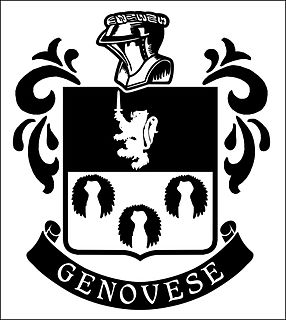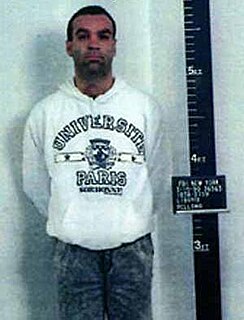Related Research Articles

Carlo Gambino was an Italian-American crime boss of the Gambino crime family. After the Apalachin Meeting in 1957, and the imprisonment of Vito Genovese in 1959, Gambino took over the Commission of the American Mafia until his death from a heart attack on October 15, 1976. During more than 50 years in organized crime, he served only 22 months in prison for a tax evasion charge in 1937.

Charles "Lucky" Luciano was an Italian-born gangster who operated mainly in the United States. Luciano started his criminal career in the Five Points gang and was instrumental in the development of the National Crime Syndicate. Luciano is considered the father of modern organized crime in the United States for the establishment of The Commission in 1931, after he abolished the boss of bosses title held by Salvatore Maranzano following the Castellammarese War. He was also the first official boss of the modern Genovese crime family.

Frank Costello was an Italian-American crime boss of the Luciano crime family. In 1957, Costello survived an assassination attempt ordered by Vito Genovese and carried out by Vincent Gigante. However, the altercation persuaded Costello to relinquish power to Genovese and retire. Costello died on February 18, 1973.

In the early hours of March 13, 1964, Kitty Genovese, a 28-year-old bartender, was raped and stabbed outside the apartment building where she lived in the Kew Gardens neighborhood of Queens in New York City, New York, United States. Two weeks after the murder, The New York Times published an article erroneously claiming that 38 witnesses saw or heard the attack, and that none of them called the police or came to her aid.

Vito Genovese was an Italian-born American mobster who mainly operated in the United States. Genovese rose to power during Prohibition as an enforcer in the American Mafia. A long-time associate and childhood friend of Lucky Luciano, Genovese took part in the Castellammarese War and helped shape the rise of the Mafia and organized crime in the United States. He would later lead Luciano's crime family, which was renamed the Genovese crime family in his honor.
Abraham Michael Rosenthal was an American journalist who served as The New York Times executive editor from 1977 to 1988. Previously he was the newspaper's city editor and managing editor. Near the end of his tenure as executive editor, he became a columnist (1987–1999). Later, he had a column for the New York Daily News (1999–2004).

The Genovese crime family is an Italian-American Mafia crime family and one of the "Five Families" that dominate organized crime activities in New York City and New Jersey as part of the American Mafia. They have generally maintained a varying degree of influence over many of the smaller mob families outside New York, including ties with the Philadelphia, Patriarca, and Buffalo crime families.
The Apalachin meeting was a historic summit of the American Mafia held at the home of mobster Joseph "Joe the Barber" Barbara, at 625 McFall Road in Apalachin, New York, on November 14, 1957. Allegedly, the meeting was held to discuss various topics including loansharking, narcotics trafficking, and gambling, along with dividing the illegal operations controlled by the recently murdered Albert Anastasia. An estimated 100 Mafiosi from the United States, Italy, and Cuba are thought to have attended this meeting. Immediately after the Anastasia murder that October, and after taking control of the Luciano crime family from Frank Costello, Vito Genovese wanted to legitimize his new power by holding a national Cosa Nostra meeting.

Genovese is an Italian surname meaning, properly, someone from Genoa. Its Italian plural form Genovesi has also developed into a surname.

Thomas "Tommy Ryan" Eboli was a New York City mobster who eventually became the acting boss of the Genovese crime family.

Dominick "Quiet Dom" Cirillo is a high-ranking member of the Genovese crime family, who briefly served as acting boss for the imprisoned Boss Vincent "Chin" Gigante.

Liborio Salvatore Bellomo is an American mobster and boss of the Genovese crime family. He served in the 116th Street Crew of Saverio "Sammy Black" Santora and was initiated in 1977. His father was a soldier and close to Anthony "Fat Tony" Salerno. In 1990, Kenneth McCabe, then-organized crime investigator for the United States attorney's office in Manhattan, identified Bellomo as "acting boss" of the crime family following the indictment of Vincent Gigante in the "Windows Case". In June 1996, Bellomo was indicted on charges of extortion, labor racketeering and for ordering the deaths of Ralph DeSimone in 1991 and Antonio DiLorenzo in 1988; DeSimone was found shot 5 times in the trunk of his car at LaGuardia Airport and DiLorenzo was shot and killed in the backyard of his home. Since around 2016, Bellomo was recognised, most likely, to be official boss of the Genovese family.

The Commission is the governing body of the Italian-American Mafia, formed in 1931 by Charles "Lucky" Luciano following the Castellammarese War. The Commission replaced the title of capo di tutti i capi, held by Salvatore Maranzano before his murder, with a ruling committee that consists of the bosses of the Five Families of New York City, as well as the bosses of the Chicago Outfit and, at various times, the leaders of smaller families, such as Buffalo, Philadelphia, Detroit, and others. The purpose of the Commission was to oversee all Mafia activities in the United States and serve to mediate conflicts among families.
Peter LaTempa was a New York mobster and associate of the Genovese crime family, who later agreed to become a government witness against Vito Genovese.
Ernest "the Hawk" Rupolo was a New York mobster and hitman for the Luciano crime family, now the Genovese crime family. Rupolo would later turn informant and testify against then-capo and future boss Vito Genovese.
The Genovese crime family's New Jersey faction is a group of Italian-American mobsters within the Genovese crime family who control organized crime activities within the state of New Jersey. The New Jersey faction is divided into multiple crews each led by a different caporegimes who oversees illegal criminal activities in labor racketeering, illegal gambling, loansharking and extortion. Since the prohibition era the Genovese family's New Jersey faction has maintained a strong presence in the Northern Jersey area. A number of members within the New Jersey faction like Guarino "Willie" Moretti, Gerardo "Jerry" Catena and Louis "Bobby" Manna have held top leadership positions in the Genovese family. From the 1990s until his death in 2010, Tino "the Greek" Fiumara was one of the most powerful capos in the New Jersey faction.

Umberto "Albert" Anastasia was an Italian-American mobster, hitman, and crime boss. One of the founders of the modern American Mafia, and a co-founder and later boss of the Murder, Inc. organization, Anastasia eventually rose to the position of boss in what became the modern Gambino crime family. He also controlled New York City's waterfront for most of his criminal career, including the dockworker unions. Anastasia was murdered on October 25, 1957, on the orders of Vito Genovese and Carlo Gambino; Gambino subsequently became boss of the family.

The Witness is a 2015 American documentary directed by James D. Solomon. His directorial debut, it was produced by Solomon, with William Genovese as Executive Producer and co-produced by Melissa Jacobson. It is narrated by Genovese who investigates the killing of his sister, Catherine Susan "Kitty" Genovese, in Kew Gardens, a neighborhood in the New York City borough of Queens, on March 13, 1964, by Winston Moseley.

Catherine Pelonero is a New York Times bestselling true crime author, best known for her 2014 book Kitty Genovese: A True Account of a Public Murder and Its Private Consequences.
Harold Takooshian is an American psychologist, scholar, and professor at Fordham University. He is best known as an expert on the Kitty Genovese murder case, having spent many years studying the subject and the role that the "bystander effect" played therein.
References
- ↑ "Charles E Skoller". Fold3. Retrieved May 8, 2020.
- ↑ Samuel, Lawrence R. (2014-04-02). New York City 1964: A Cultural History. ISBN 9781476615196.
- ↑ "Charles e. Skoller".
- ↑ "Charles Skoller Obituary (2012) the Palm Beach Post".